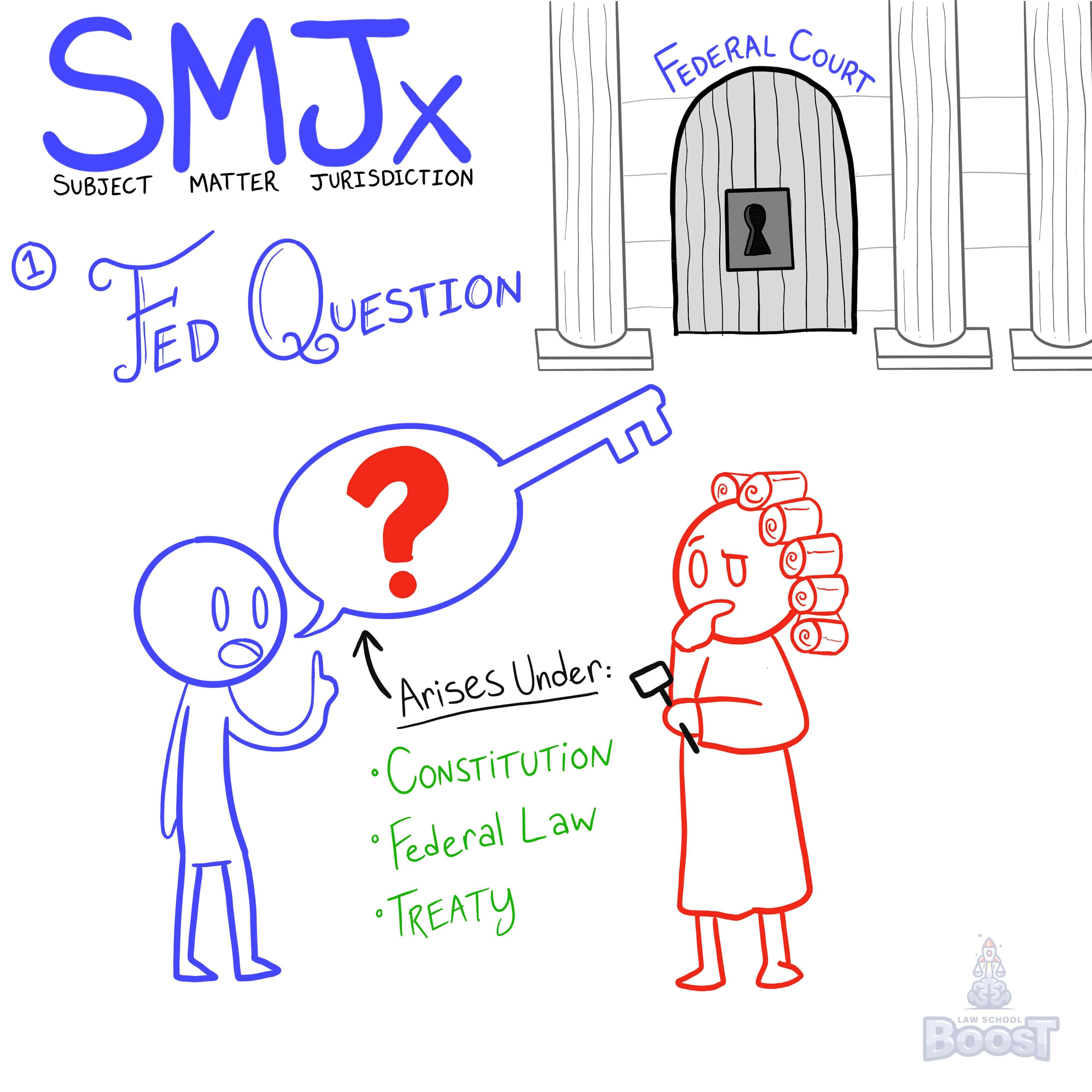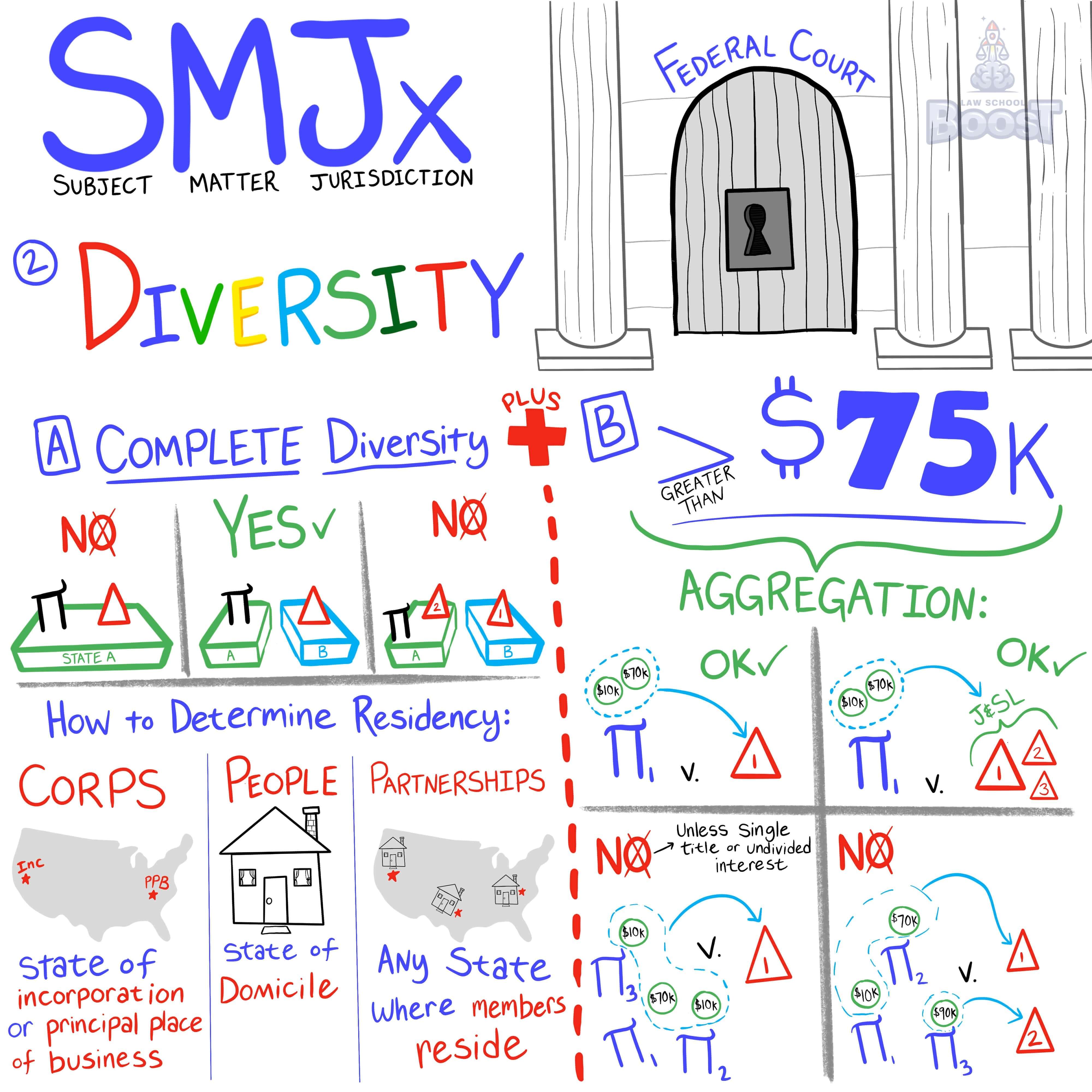🤤
Civil Procedure • Subject Matter Jurisdiction
CIVPRO#009
Legal Definition
Subject matter jurisdiction is the authority of a court to hear particular types of cases related to a specific subject matter. It is always required and cannot be waived in federal court. Federal subject matter jurisdiction may be based on: (1) a federal question, or (2) complete diversity of citizenship between the parties.
Plain English Explanation
Sometimes a court has jurisdiction over a defendant because they have jurisdiction over the defendant themselves (personal jurisdiction). Other times, however, a court may have jurisdiction over a defendant because the type of case (or "subject matter" of the case) falls under the court's jurisdiction.
Another way to think about this is state courts are courts of general jurisdiction, meaning they can hear just about any case that isn't reserved for federal courts, and federal courts are courts of limited jurisdiction, meaning they can only hear a very narrow assortment of cases.
Where the subject matter of a case falls within one of the defined keys to enter federal court (discussed in other cards), then a party of the lawsuit may argue that they would rather have a federal court hear the case under subject matter jurisdiction.
There are generally 4 keys you will need to learn, each of which unlock the door to federal court: (1) Diversity of Citizenship; (2) Federal Question; (3) Removal Jurisdiction; and (4) Supplemental Jurisdiction. Each of these will be covered in their own cards.
Another way to think about this is state courts are courts of general jurisdiction, meaning they can hear just about any case that isn't reserved for federal courts, and federal courts are courts of limited jurisdiction, meaning they can only hear a very narrow assortment of cases.
Where the subject matter of a case falls within one of the defined keys to enter federal court (discussed in other cards), then a party of the lawsuit may argue that they would rather have a federal court hear the case under subject matter jurisdiction.
There are generally 4 keys you will need to learn, each of which unlock the door to federal court: (1) Diversity of Citizenship; (2) Federal Question; (3) Removal Jurisdiction; and (4) Supplemental Jurisdiction. Each of these will be covered in their own cards.
Hypothetical
Hypo 1: Sam works for Bob. One day, Bob suddenly fires Sam and refuses to pay him for his hours worked that day. Sam tries to sue Bob in federal court. Result: Sam won't be able to sue Bob in federal court, because the subject matter of his suit is not within the subject matter jurisdiction of federal court. This is a wage claim, which would be a simple labor issue that the state is equipped to handle.
Hypo 2: Sam works for Bob. One day, Bob suddenly fires Sam. When Sam asks "Why?" Bob responds, "Because you're black and I don't want a black employee." Sam tries to sue Bob in federal court. Result: There are plenty of states with laws that make it illegal to fire someone based on their race, and it would be appropriate for Sam to sue Bob in their state's court. However, there are also federal laws that make this illegal. This means that the subject matter of Sam's suit unlocks the "Federal Question" door, allowing Sam to sue Bob in federal court.
Hypo 2: Sam works for Bob. One day, Bob suddenly fires Sam. When Sam asks "Why?" Bob responds, "Because you're black and I don't want a black employee." Sam tries to sue Bob in federal court. Result: There are plenty of states with laws that make it illegal to fire someone based on their race, and it would be appropriate for Sam to sue Bob in their state's court. However, there are also federal laws that make this illegal. This means that the subject matter of Sam's suit unlocks the "Federal Question" door, allowing Sam to sue Bob in federal court.
Visual Aids



Related Concepts
How can subject matter jurisdiction be based on a federal question?
How can subject matter jurisdiction be based on diversity of citizenship?
How is citizenship determined under subject matter jurisdiction?
What is supplemental jurisdiction?
What types of cases will California courts exercise general subject matter jurisdiction over?
When is aggregation of damages under a diversity claim allowed and not allowed?
When may a federal court hear a state claim?


